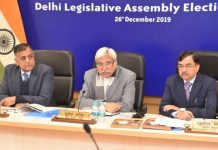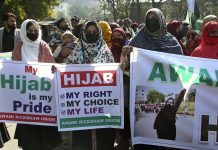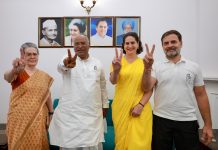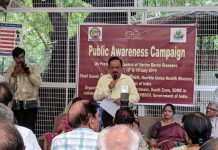
WE BELIEVE in God and God is great,” a beaming Yasin Patel told TEHELKA on August 5, 2008 after the SIMI tribunal rejected the Centre’s ban on SIMI. Yasin Patel has the dubious distinction of being the only SIMI activist to have been convicted under the draconian Prevention of Terrorism Act (POTA). His crime: allegedly sticking an “anti-India” poster inside Delhi’s Jamia Milia Islamia University. His witnesses: only policemen. The evidence: the alleged poster.
A native of Ahmedabad, Patel left Gujarat following the anti- Muslim violence of February- March 2002. He was arrested in New Delhi on May 26 that year. In 2003, the court accepted the prosecution’s argument that the alleged poster denigrated an image of India’s flag and sentenced him to five years in jail under POTA and, concurrently, seven years for spreading disaffection against the Indian government.
Patel had told the court that he was arrested from home at midnight and the poster story was a plant. In any case, the poster in question, printed by SIMI in 1996, did not contain India’s flag. Rather, it showed an image of a clenched fist and the maps of the five members of the UN Security Council: the US, Britain, Russia, China and France. Its text slammed the UN for becoming a handmaiden of these nations instead of staying neutral as per its mandate. On this ground, Patel appealed against his conviction before the High Court, which granted him bail in August 2004. By then, Patel had spent 27 months in jail.
During his trial, Patel recalls the public prosecutor hardly spoke; it was the judge SN Dhingra (who also tried the Parliament attack case) who countered the defence all the time. Police records showed Patel was arrested from the spot at 1.30 pm. and both the police and the accused were there until 7.30 pm. Why then, the defence lawyer asked, were no public witness found in this long period? Because, said the judge, people are afraid of SIMI. The judge saw the poster and said: “It looks more dangerous to me than an AK47.” As the judge dictated Patel’s oral submissions from the cross-examination to his typist, he misquoted one line. Patel spoke out to correct him. “Tell your client to watch his tongue,” the judge bluntly told the defence lawyer. “He will regret it if he doesn’t.”
AMADARSA alumnus from Azamgarh in Uttar Pradesh, where he and SIMI’s ex-president Shahid Badr Falahi were classmates, Patel joined SIMI in 1985 and stayed on till his mandatory retirement in 1997 at the age of 30. He rose to become secretary of SIMI’s Uttar Pradesh unit. For a living, Patel set up a printing unit in Ahmedabad and published books on politics, socialism, psychology and languages. As an outspoken Muslim youth, he often called public meetings to ask Muslims to defend themselves against attacks on the community. This brought him under the police scanner which began harassing him in the 1990s.
Patel’s parents and siblings are settled in Chicago and are US citizens. He, too, moved in 1992 and lived there for two years. At school, he topped his class on social science. “But I wore a beard and both the teachers and the students kept their distance from me,” Patel recalls. “I realised I have no future in the US so I came back.” Today, Patel says he will live and die in India. “The bones of the Muslims are buried in this land,” he says. “Now India has to decide whether it wants us or not.” •













